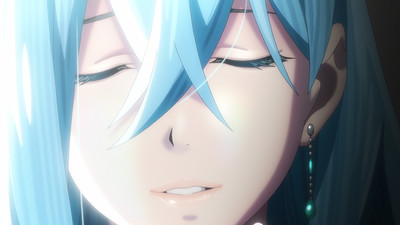Vivy -Fluorite Eye's Song-
Episodes 1-4
by Richard Eisenbeis,
How would you rate episode 1 of
Vivy -Fluorite Eye's Song- ?
Community score: 4.2
How would you rate episode 2 of
Vivy -Fluorite Eye's Song- ?
Community score: 4.6
How would you rate episode 3 of
Vivy -Fluorite Eye's Song- ?
Community score: 4.6
How would you rate episode 4 of
Vivy -Fluorite Eye's Song- ?
Community score: 4.7

(*Note: The review of the first two episodes is copy-pasted from when I reviewed them for The Spring 2021 Preview Guide—which also includes reviews of these episodes from four other ANN reviewers. The episode 3 and 4 portion of the review is completely new.)
Episodes 1 and 2:
“In which Westworld meets The Terminator.”
Diva is the first true AI android and has been designed to work at a major theme park as a singer. Sadly, she's not great at it—though she has managed to gain a single fan in the form of a young girl. Her life changes when Matsumoto, an AI from 100 years in the future, comes back in time to request Diva's help in preventing the looming robot apocalypse.
If two AI working together to stop the robot apocalypse weren't enough of a twist on the genre, there is a second one. In most stories about the creation and evolution of AI, it is the curtailing of AI rights—of not treating AI as equal to people—that leads to a robot uprising. In this anime, it's giving AI rights that causes it, allowing AI to advance too quickly and bring about the violent end of humanity in just 100 years' time. While the first two episodes revolve around Diva's fight against a group of anti-AI terrorists—whose actions inadvertently caused a pro-AI culture shift in Matsumoto's original timeline—the real drama in the anime comes from the conflict between Diva and Matsumoto.
In the world of Vivy, AIs are unable to have more than one primary mission. Diva's is to bring happiness through song. It's this one goal that dictates all of her other behaviors. There are no three laws of robotics controlling Diva's actions. In fact, the only reason she agrees to help Matsumoto stop the robot apocalypse is due to the fact that, in order to make humans happy through singing, those humans have to be alive.
Matsumoto's one goal, on the other hand, is simply to stop the robot apocalypse—namely by hampering the evolution of AI over the coming 100 years. To best do this, however, he must keep the current timeline as similar to the original one as possible. That way he has a clear road map of what is to come and can prepare Diva to combat it.
Where conflict arises is in the fact that Diva wants to use their future knowledge to save as many lives as possible while Matsumoto doesn't want to “save” anyone. He wants those who died in his timeline to die and those who lived to live. This makes Diva and Matsumoto both allies and enemies—united in cause but opposed in means.
But what's interesting is that as their hundred-year journey moves forward, Matsumoto will become less and less effective as technology advances. Meanwhile, Diva, with her physical body, will become more and more necessary. So while Matsumoto may have overall control now, it's only a matter of time until the balance of power shifts.
Episode 1: Rating:
Episode 2: Rating:

Episodes 3 and 4:
The third episode takes place 15 years after the events of the first two and follows Diva (or “Vivy” as we'll call her from here on out) and Matsumoto on their mission to stop a space hotel from crashing to Earth due to the mysterious actions of the hotel's AI administrator, Estella. Of course, Matsumoto wants to go for the quick and dirty resolution—destroy Estella ASAP. After all, if Estella is eliminated, she'll be unable to crash the hotel. However, it only takes Vivy a few moments with Estella to see that there is more going on here than an AI randomly going crazy and killing people.
To understand why, we need only look at Vivy herself. In the years since the assassination attempt on Aikawa, her public performances have become more popular than ever before—packing in the crowds in her little theater. It's not hard to figure out that this is a direct result of what happened in the first two episodes. Back then, Vivy simply copied other singers in tone and gesture while on stage. Due to the death of Momoka, Vivy is now able to sing with true emotion, having felt loss, sadness, regret, and guilt—not to mention hatred for Matsumoto. These, mixed with her determination to fulfill her promise to Momoka to sing on the main stage, have forged her into something far more than she was.
This is why Vivy couldn't believe that Estella is the one who brought down the space hotel. Estella, like all autonomous AIs, is based on Vivy. And like Vivy, she has experienced personal loss, and reshaped her own goals as a result. Her mission in life was to take care of humans as a “life keeper.” She has spent the majority of her years in space, caring for the humans who visited the hotel alongside the hotel's owner and the rest of the human staff. Yet, in the most objective sense, she failed in her mission when the owner of the hotel died in an accident while on an EVA.
This loss, however, galvanized Estella to continue the old owner's dream. She decided to keep running the hotel and ensure that its visitors have a safe and joyous experience on their visit to space. As such, for Estella to bring the symbol of the old owner's dream crashing down in a ball of fire would be the same as Vivy betraying her promise to Momoka to sing on the main stage—it is literally unthinkable. To Vivy, this is proof that there must be some outside factor besides Estella contributing to the fated incident. Which brings us to Elizabeth.
Elizabeth, who is identical to Estella in nearly every way, never had the same opportunities to grow. After half a year of half-activation—sharing Estella's experiences—she was discarded as a failure for not being an exact mental copy of Estella. Being picked up by the anti-AI terrorists, she developed in a markedly different fashion despite having the same directive. Rather than seeking to protect the lives of all humans, she focused her mission upon a single person, Yugo. Elizabeth would have no issue dropping the space hotel and killing all the humans on board. However, what she can't accept is the idea of Yugo himself dying. Thus, she secretly changes the hotel's decent vector to drop it on a human city. That way humans will die because of a supposedly safe AI and Yugo won't have to sacrifice himself. Of course, when Yugo decides to confront Vivy, threatening to mess up her plan, Estella knocks him out—forcing the other terrorists to take him and escape while she goes to make sure the mission is a success.
But what's important to note is that after her fight with Vivy—and subsequent reformatting—Elizabeth happily helps Estella on her suicide mission to break up the station before reentry and ensure that no humans die. This makes clear the underlying theme of these episodes—they're an allegory on nature versus nurture. AIs are inherently good; only the callous actions of humans can turn them into something twisted. If the robot apocalypse is to truly occur, it will be the fault of humans at its core.
Episode 3: Rating:
Episode 4: Rating:
Random Thoughts:
• Vivy was very much against Matsumoto upgrading her programming in the first two episodes, fearing she might lose part of what makes her a singer (and thus hamper her life's mission). In episode 4, she doesn't hesitate. Protecting Momoka's sister—which she couldn't do for Momoka—is more important to her than a hypothetical loss of functions (and more important than any mission from the future, for that matter).
• It's interesting to note that Matsumoto shut himself down for 15 years after repairing Vivy after the end of episode 2—proving he is being truthful about wanting to interfere with the timeline as little as possible.
• It's worrying that Matsumoto isn't upset about the unexpected results of what happened in the first episode. AIs now have more freedom than they did in the original timeline, which is exactly what he tried to prevent in the first place. Yet, he shrugs this off like it is nothing, implying there might be more going on with Matsumoto's plan than we realize.
• Matsumoto's going to be more than a little surprised when he wakes up at Yuzuka's house and has to hop on a plane in his stuffed bear body to get back to NiaLand.
• Yuzuka is now the second person to know about both sides of Vivy's double-life. I wonder if she and Aikawa will be regularly visiting the stage show in the years to come.
• I did like how Aikawa went from false martyr to true activist due to the events of the first two episodes. While it's generally true that people don't change, if having the world's first autonomous AI save your life twice in one day doesn't do it, nothing will.
• Visually, I love the electric arcs flying across Vivy's body as she fights Elizabeth. I also like the implication that Vivy, who is not designed for combat, is basically overclocking herself and doesn't have the necessary insulation to stop her electricity from breaking free.
• This marks the second time Yugo has had his life saved by the AI he so detests.
Vivy -Fluorite Eye's Song- is currently streaming on Funimation.
Richard is an anime and video game journalist with over a decade of experience living and working in Japan. For more of his writings, check out his Twitter and blog.
discuss this in the forum (93 posts) |
back to Vivy -Fluorite Eye's Song-
Episode Review homepage / archives